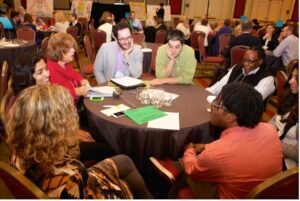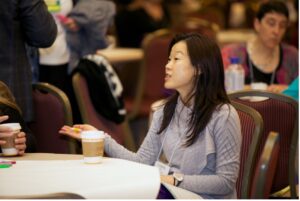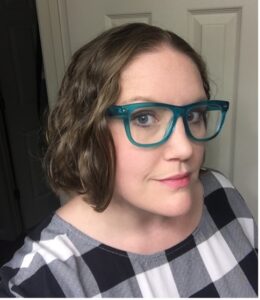By Courtney Breese

It’s easy to see that our nation is polarized. Watch any national news program or scroll social media and this narrative of polarization is overwhelming. However, the truth is more complex. While there is plenty of polarization to go around, especially when we engage in talking about national politics, there are lots of people around the country (and the world, for that matter) doing the necessary work to bring people together across these differences. These people have brought communities together to expand their collective understanding, shared humanity, and ultimately to make decisions that consider all perspectives and options. This is the work broadly defined as “dialogue and deliberation.”
Dialogue and deliberation are innovative processes that help people come together across differences to tackle our most challenging problems. Dialogues emphasize creating a shared understanding whether it be with one another, of a topic, or an issue. It is about deep listening and respectful inquiry. Deliberation asks community members to examine possibilities for action. By weighing the options, including the benefits, drawbacks, and potential tradeoffs, a community can come to a more workable solution that addresses shared values and priorities.
Get notified when new articles are posted to the EDR blog – sign up for our email list »
The practices of dialogue and deliberation are varied and can be used by people in a variety of contexts. While there are practitioners and organizations who specifically focus on these practices as a profession, people have also embraced these practices in their work in nonprofits, governments, libraries, higher education, businesses, museums, as well as community members bringing people together voluntarily. These practices can be used for community-building events including potlucks, book clubs, and networking events. They can also help expand students’ knowledge of an issue, involve residents in decision making about local issues, learn more from patrons about their interests, and more.
What it takes to hold a dialogue or deliberation conversation is relatively simple. A good process typically includes:
- A process you will follow: Are you having a dialogue or deliberation? What kind of conversation will you have? Some of these processes are outlined in the National Coalition for Dialogue and Deliberation’s (NCDD) Engagement Streams Framework.
- A topic: What are you going to discuss? There are great materials out there already for many processes, or you can set your own topic. An overarching question makes for a good topic.
- A set of agreements or ground rules: What will participants agree to in order to ensure the conversation is respectful and open to various perspectives? Many processes have their own suggested set of agreements, or you can make your own.
- A facilitator: Who will lead participants in the conversation? You will need someone to be impartial, to help lead the conversation but not participate themselves. It’s important to have this role to help people feel like the conversation is led by someone who does not have a strong perspective or preferred outcome in mind already. Maybe that is you!

Where to begin? Check out the processes and see what works for you. Want to start simple? Processes such as Conversation Cafe, Living Room Conversations, and National Issues Forums have materials available to help you get started. Explore the many options out there and connect with others doing this work. The National Coalition for Dialogue & Deliberation (NCDD), is a network of people committed to this work and is a great resource as you start your journey.
Engaging our communities through dialogue and deliberation practices can help us to work through our differences, reconnect, and re-establish our shared humanity. This can help us to turn the tide on our current narrative of polarization. It’s a process that will take time and commitment from our leaders and from one another. But, if we come together in community over time, we can see each other as equals with shared values and important perspectives.
 Courtney Breese is the Executive Director of the National Coalition for Dialogue & Deliberation (NCDD), a network of practitioners and organizations committed to helping communities discuss, decide, and take action together on today’s toughest issues. Courtney is a facilitator, mediator, and trainer, who loves to introduce people to practices for community engagement and empowerment. She has a Bachelor of Arts in Social Work & Counseling from Franklin Pierce University, where she first learned the practices of dialogue and deliberation.
Courtney Breese is the Executive Director of the National Coalition for Dialogue & Deliberation (NCDD), a network of practitioners and organizations committed to helping communities discuss, decide, and take action together on today’s toughest issues. Courtney is a facilitator, mediator, and trainer, who loves to introduce people to practices for community engagement and empowerment. She has a Bachelor of Arts in Social Work & Counseling from Franklin Pierce University, where she first learned the practices of dialogue and deliberation.
